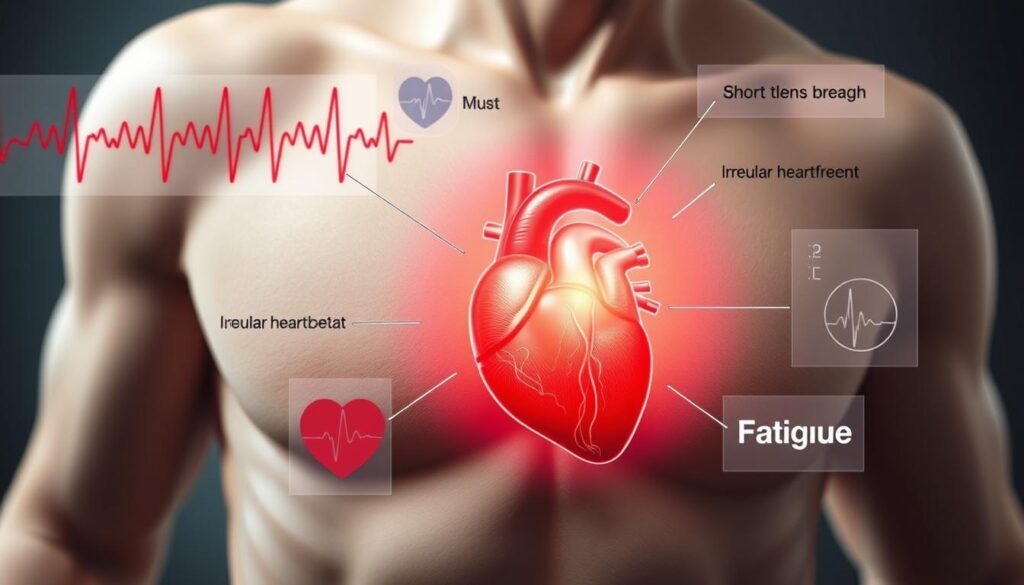This post contains affiliate links. As an Amazon Associate I earn from qualifying purchases
Maintaining a healthy heart is crucial for overall well-being. With heart disease being a leading cause of concern globally, it’s essential to adopt habits that promote cardiovascular well-being. Simple changes in daily routines can significantly impact heart health.
By incorporating heart-healthy habits into your lifestyle, you can reduce the risk of heart disease and improve your overall quality of life. This article will explore effective cardiovascular health tips to help you achieve a healthier heart.
Key Takeaways
- Understand the importance of heart health
- Learn simple dietary changes for a healthier heart
- Discover the role of exercise in maintaining cardiovascular well-being
- Explore stress management techniques for heart health
- Find out how regular check-ups can help prevent heart disease
Understanding Cardiovascular Health
Understanding the basics of cardiovascular health is the first step towards preventing heart disease and ensuring a healthy life. Cardiovascular health refers to the well-being of the heart, arteries, and the circulatory system as a whole.
What Is Cardiovascular Health?
Cardiovascular health encompasses the health of the heart and the blood vessels. It involves ensuring that the heart is able to pump blood efficiently and that the arteries remain clear and functional. A healthy cardiovascular system is crucial for delivering oxygen and nutrients to tissues and organs.
Factors that influence cardiovascular health include diet, physical activity, smoking, and genetic predispositions. By managing these factors, individuals can significantly reduce their risk of heart disease.
Importance of Cardiovascular Health
Maintaining good cardiovascular health is vital for overall wellbeing. It reduces the risk of heart disease, stroke, and other cardiovascular conditions. Healthy heart tips often focus on lifestyle changes such as improving diet, increasing physical activity, and quitting smoking.
- Reduces the risk of heart disease and stroke
- Improves overall quality of life
- Enhances physical fitness and endurance
- Supports mental health by reducing stress
By prioritizing cardiovascular health, individuals can take proactive steps towards preventing heart disease and maintaining a healthy heart throughout their lives.
Key Risk Factors for Heart Disease
Several factors contribute to the risk of developing heart disease, and being aware of them can help in taking preventive measures. Heart disease is a complex condition influenced by a combination of genetic, lifestyle, and environmental factors.
High Blood Pressure
High blood pressure, or hypertension, is a significant risk factor for heart disease. It forces the heart to work harder, potentially leading to heart failure or damage to the arteries. Managing high blood pressure through lifestyle changes and, if necessary, medication can significantly reduce the risk of heart disease.
- Monitor your blood pressure regularly
- Maintain a healthy diet low in sodium
- Exercise regularly to help lower blood pressure
High Cholesterol Levels
High levels of cholesterol can lead to plaque buildup in the arteries, known as atherosclerosis, increasing the risk of heart disease. Understanding your cholesterol levels and managing them through diet, exercise, and if necessary, medication, is crucial.
- Get your cholesterol levels checked as part of a regular health checkup
- Eat a diet rich in fruits, vegetables, and whole grains
- Limit intake of saturated and trans fats
Smoking and Its Effects
Smoking is a major risk factor for heart disease as it damages the lining of the arteries, increases blood pressure, and reduces blood flow to the heart. Quitting smoking can significantly reduce the risk of heart disease and improve overall health.
- Seek support from healthcare professionals or support groups to quit smoking
- Use nicotine replacement therapy or other medications as recommended
- Avoid exposure to secondhand smoke
Sedentary Lifestyle
A sedentary lifestyle contributes to a higher risk of heart disease. Regular physical activity helps maintain a healthy heart by improving circulation, lowering blood pressure, and increasing overall cardiovascular health. Incorporating physical activity into your daily routine is essential for heart health.
- Aim for at least 150 minutes of moderate-intensity exercise or 75 minutes of vigorous-intensity exercise per week
- Include strength training exercises in your routine
- Find activities you enjoy to make exercise a sustainable part of your lifestyle
Nutrition Tips for a Healthy Heart
A well-balanced diet is foundational to a heart-healthy lifestyle. Making informed nutritional choices can significantly impact your cardiovascular health. In this section, we will explore the foods that are beneficial for heart health, those that should be avoided, and strategies for effective meal planning.
Heart-Healthy Foods to Incorporate
Incorporating certain foods into your diet can help improve heart health. These include:
- Fatty Fish: Rich in omega-3 fatty acids, fish like salmon and mackerel can help reduce inflammation and improve heart health.
- Leafy Greens: Spinach, kale, and other leafy greens are rich in vitamins and minerals that support heart health.
- Nuts and Seeds: Almonds, walnuts, and chia seeds are good sources of healthy fats and antioxidants.
- Whole Grains: Whole grain bread, brown rice, and quinoa are rich in fiber, which can help lower cholesterol levels.
Foods to Avoid for Better Heart Health
Just as important as knowing what to eat is understanding what foods to limit or avoid. These include:
- Sugary Drinks: Consuming high amounts of sugar can lead to obesity and increase the risk of heart disease.
- Processed Meats: Foods like bacon and sausages are high in sodium and saturated fats, which can negatively impact heart health.
- Refined Carbohydrates: White bread and pastries can cause a spike in blood sugar and insulin resistance.
- Foods High in Saturated and Trans Fats: Limiting foods like butter, margarine, and processed snacks can help maintain healthy cholesterol levels.
Meal Planning Strategies
Effective meal planning is key to maintaining a heart-healthy diet. Here are some strategies:
- Plan Ahead: Take some time each week to plan your meals for the next few days. This can help you avoid last-minute, unhealthy choices.
- Shop Smart: Make a grocery list based on your meal plan and stick to it. Focus on whole, unprocessed foods.
- Cook at Home: Preparing meals at home allows you to control the ingredients and portion sizes, making it easier to eat healthily.
- Batch Cooking: Cooking in bulk can save time and ensure you have healthy meals ready for the week.
By incorporating these nutrition tips into your daily routine, you can take significant steps towards improving your heart health and adopting a heart-healthy lifestyle.
The Role of Exercise in Cardiovascular Health
Engaging in physical activity is essential for overall cardiovascular well-being. Regular exercise not only strengthens the heart but also improves circulation, boosts mood, and helps maintain a healthy weight. With numerous benefits, incorporating physical activity into your daily routine is a crucial step towards achieving tips for a healthy heart.
Recommended Types of Exercise
There are several types of exercises that are beneficial for cardiovascular health. These include:
- Aerobic exercises such as walking, running, cycling, and swimming, which are excellent for improving heart health.
- Resistance training, like weight lifting, which can help build muscle and boost metabolism.
- Flexibility exercises, such as yoga and stretching, which improve flexibility and reduce the risk of injury.
How Much Should You Exercise?
The American Heart Association recommends at least 150 minutes of moderate-intensity aerobic activity or 75 minutes of vigorous-intensity aerobic activity per week, or a combination of both. Additionally, incorporating muscle-strengthening activities on two or more days a week can further enhance cardiovascular health.
| Exercise Type | Frequency | Duration |
|---|---|---|
| Aerobic Exercise | At least 5 days a week | 30 minutes per session |
| Resistance Training | 2-3 days a week | 20-30 minutes per session |
Benefits of Regular Physical Activity
Regular exercise offers numerous benefits for cardiovascular health, including:
- Lowering blood pressure and improving circulation.
- Reducing the risk of heart disease, stroke, and diabetes.
- Aiding in weight management and improving body composition.
- Enhancing mood and reducing symptoms of anxiety and depression.
By incorporating a mix of aerobic exercise, resistance training, and flexibility exercises into your routine, you can significantly improve your cardiovascular health and overall well-being. Remember, the key is to find activities you enjoy and make them a consistent part of your lifestyle.
Importance of Regular Health Checkups
Understanding the importance of regular health checkups can be a game-changer in the pursuit of cardiovascular wellness. Regular checkups are fundamental in monitoring and maintaining heart health, allowing for early detection and management of potential issues.
During these checkups, several tests can be expected. These include blood pressure checks, cholesterol level assessments, and possibly electrocardiograms (ECGs) or other heart function tests depending on individual risk factors and health status.
Tests to Expect
Healthcare providers may recommend various tests to assess cardiovascular health. Blood pressure monitoring is crucial as high blood pressure is a significant risk factor for heart disease. Lipid profiles are also important, providing insights into cholesterol levels and the risk of heart disease.
- Blood Pressure Checks
- Cholesterol Level Assessments
- Electrocardiograms (ECGs)
- Other heart function tests as necessary
Frequency of Checkups
The frequency of health checkups can vary based on age, health status, and risk factors. Generally, adults are advised to have regular checkups at least once a year. Those with a history of heart disease or other risk factors may need more frequent monitoring.
Understanding Your Results
After undergoing tests, understanding the results is key to taking appropriate action. Healthcare providers will interpret the results, explaining what they mean for your heart health and recommending any necessary lifestyle changes or treatments.
By staying on top of regular health checkups and understanding the results, individuals can take proactive steps towards maintaining cardiovascular wellness. This proactive approach can significantly reduce the risk of heart disease and improve overall health outcomes.
Managing Stress for Better Heart Health
The connection between stress and heart health is undeniable, and learning to manage stress is key to a healthier heart. Chronic stress can lead to a variety of heart-related issues, including high blood pressure and heart disease. Therefore, incorporating effective stress management techniques into your daily routine is crucial for maintaining cardiovascular wellbeing.
The Impact of Stress on Cardiovascular Health
Stress triggers the release of hormones like cortisol and adrenaline, which can increase heart rate and blood pressure. Over time, this can lead to damage to the heart and blood vessels, increasing the risk of heart disease. Managing stress is a vital component of cardiovascular health tips that can help mitigate this risk.

Techniques such as meditation, deep breathing, and yoga have been shown to reduce stress levels. Incorporating these practices into your daily routine can provide heart health advice that goes beyond traditional health recommendations.
Effective Techniques for Stress Reduction
- Meditation and mindfulness practices
- Physical activity, such as walking or yoga
- Deep breathing exercises
- Journaling or expressive writing
These techniques not only help in reducing stress but also contribute to overall wellbeing. By adopting these practices, individuals can significantly improve their heart health.
The Role of Mindfulness in Heart Health
Mindfulness, the practice of being present in the moment, has been linked to various health benefits, including reduced stress and improved heart health.
“Mindfulness is the practice of being fully present and engaged in the current moment, without judgment. It has the potential to transform our relationship with stress and improve our overall wellbeing.”
| Technique | Benefits |
|---|---|
| Meditation | Reduces stress, improves mental clarity |
| Yoga | Enhances flexibility, reduces stress |
| Deep Breathing | Lowers blood pressure, calms the mind |
By incorporating these stress management techniques into daily life, individuals can take a proactive approach to cardiovascular health tips and improve their overall heart wellbeing.
The Signature of a Heart-Healthy Lifestyle
To achieve optimal heart health, it’s essential to incorporate several key habits into your daily routine. A heart-healthy lifestyle is not just about avoiding heart disease; it’s about adopting habits that promote overall well-being.
Daily Habits to Adopt
Developing healthy daily habits is crucial for maintaining a healthy heart. This includes being physically active, eating a balanced diet, and managing stress effectively. For instance, incorporating healthy heart tips such as taking the stairs instead of the elevator or going for a short walk during your lunch break can make a significant difference.
Another important habit is to limit your intake of processed foods and sugars. Instead, focus on consuming a variety of fruits, vegetables, whole grains, and lean proteins. These foods provide essential nutrients that support heart health.
Importance of Sleep
Adequate sleep is vital for heart health. During sleep, your body repairs and rejuvenates itself, which helps to regulate stress hormones and maintain healthy blood pressure. Aim for 7-8 hours of sleep per night to help your heart function at its best.
To improve sleep quality, establish a bedtime routine that signals to your body that it’s time to sleep. This can include activities like reading, meditation, or a warm bath. Avoid screens and electronic devices at least an hour before bedtime to reduce exposure to blue light, which can interfere with your sleep.
Staying Hydrated
Staying hydrated is another critical aspect of a heart-healthy lifestyle. Drinking enough water helps your heart pump blood more efficiently, reducing the risk of heart disease. Aim to drink at least eight glasses of water per day, and adjust your intake based on your activity level and climate.
In addition to water, you can also consume hydrating foods like watermelon, cucumbers, and celery. Limit your intake of sugary drinks and caffeine, which can have dehydrating effects.
By incorporating these daily habits into your lifestyle, you can significantly improve your heart health and overall well-being. Remember, small changes can add up over time, so start with one or two habits and gradually build up to a more comprehensive heart-healthy routine.
Recognizing Symptoms of Heart Issues
Being aware of the common symptoms associated with heart issues is vital for preventing severe cardiovascular events. Heart health is a critical aspect of our overall well-being, and timely recognition of its warning signs can lead to better health outcomes.

Common Warning Signs
Several symptoms may indicate potential heart issues. These include chest pain or discomfort, often described as a feeling of pressure or tightness in the chest. Shortness of breath is another significant symptom, which can occur even at rest. Other warning signs are pain or weakness in the legs or arms, dizziness or lightheadedness, and palpitations or irregular heartbeats.
It’s essential to be aware of these symptoms and not dismiss them as minor issues. If you experience any of these, it’s crucial to take them seriously and consider seeking medical advice.
When to Seek Medical Attention
If you’re experiencing symptoms like chest pain, severe shortness of breath, or fainting, seek immediate medical attention. These could be signs of a serious heart condition that requires prompt treatment.
For less severe but persistent symptoms, schedule an appointment with your healthcare provider. Discussing your symptoms and concerns with a professional can help in early detection and prevention of heart disease.
Adopting a heart-healthy lifestyle is also crucial. This includes a balanced diet, regular physical activity, not smoking, and managing stress. By combining awareness of heart issue symptoms with healthy habits, you can significantly reduce your risk of heart disease.
Supporting Heart Health with Supplements
While a balanced diet is essential, certain supplements can provide additional support for cardiovascular well-being. A heart-healthy lifestyle involves a combination of proper nutrition, regular exercise, and sometimes, the right supplements.
Popular Heart-Health Supplements
Several supplements have gained attention for their potential benefits to heart health. These include:
- Omega-3 Fatty Acids: Known for their anti-inflammatory properties, omega-3s can help reduce triglycerides and lower blood pressure.
- Coenzyme Q10 (CoQ10): This antioxidant helps generate energy in cells and has been linked to improved heart health.
- Potassium: Essential for maintaining healthy blood pressure, potassium supplements can be beneficial for individuals with deficiencies.
- Magnesium: This mineral plays a crucial role in heart rhythm and is often recommended for individuals with heart conditions.
As noted by the
“The American Heart Association emphasizes the importance of a balanced diet rich in fruits, vegetables, and whole grains, but also acknowledges the potential benefits of certain supplements for heart health.”
Consultation Before Starting Supplements
Before adding any supplements to your regimen, it’s crucial to consult with a healthcare professional. They can help determine the safety and efficacy of supplements based on your individual health needs.
| Supplement | Potential Benefits | Precautions |
|---|---|---|
| Omega-3 Fatty Acids | Reduces triglycerides, lowers blood pressure | May interact with blood thinners |
| Coenzyme Q10 (CoQ10) | Antioxidant properties, energy production | May interact with certain medications |
| Potassium | Maintains healthy blood pressure | Can cause hyperkalemia if taken in excess |
Foods Rich in Essential Nutrients
In addition to supplements, incorporating foods rich in essential nutrients can significantly support heart health. Some examples include:
- Fatty Fish: Salmon and mackerel are high in omega-3 fatty acids.
- Leafy Greens: Spinach and kale are rich in magnesium and potassium.
- Nuts and Seeds: Almonds and flaxseeds are good sources of healthy fats and fiber.
By combining a balanced diet with informed supplement choices and regular health checkups, individuals can take proactive steps towards maintaining a healthy heart.
Building a Support System for Heart Health
Maintaining cardiovascular wellness requires a holistic approach that includes a strong support system. Surrounding yourself with people who encourage and motivate you can make a significant difference in your heart health journey.
Family and Friends
Involving family and friends in your heart-healthy habits can be incredibly beneficial. Share your goals and progress with them, and ask for their support in making healthy choices, such as exercising together or preparing healthy meals.
Support Groups
Joining a support group can provide an additional layer of motivation and accountability. Many organizations, like the American Heart Association, offer support groups and resources for individuals looking to improve their cardiovascular health.
Community Resources
Utilizing community resources, such as local fitness classes or health workshops, can also be beneficial. These resources can provide valuable information and support to help you stay on track with your cardiovascular health tips and maintain overall wellness.
FAQ
What are some simple ways to start improving my cardiovascular health?
How often should I check my blood pressure and cholesterol levels?
Can stress really affect my heart health?
Are there any specific foods that can help lower my risk of heart disease?
How much exercise do I need to do to improve my cardiovascular health?
Can supplements really support heart health?
How can I maintain a heart-healthy lifestyle over time?
This post contains affiliate links. As an Amazon Associate I earn from qualifying purchases





